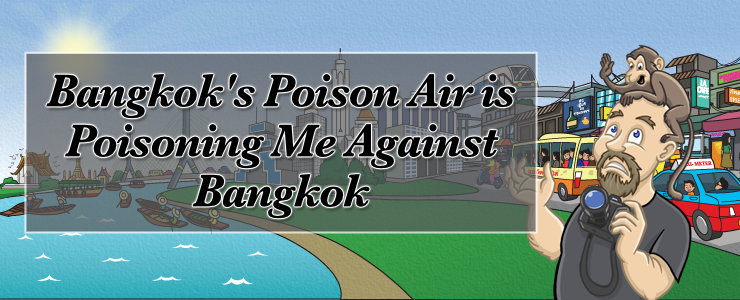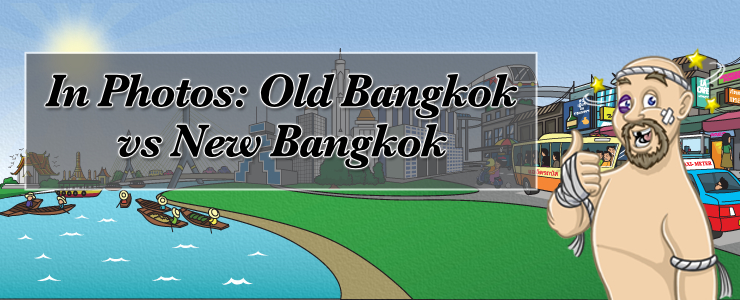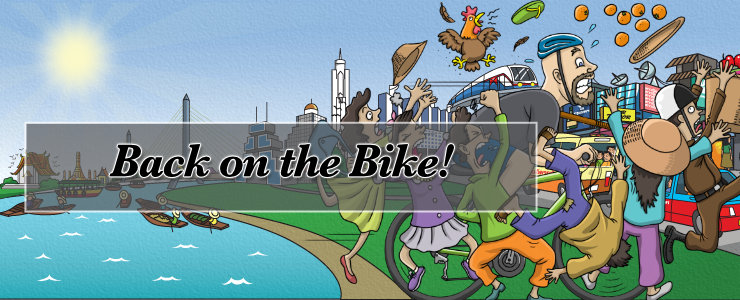No, not the type where heavily armed Somolian teenagers try to board 330-foot long oil tankers from an inflatable dinghy with a cake-mixer motor. Rather, I’m talking about the type where you can buy fake name brand stuff for really cheap! Everyone knows that Thailand is one of the best countries to buy worst offenders when it comes to selling fake stuff. Thailand has recently seen a crackdown on illegal goods vendors, ramped up as a direct result of a United States Trade Representative report saying, essentially, Thailand sells pirated goods, so they’re bad. Here’s my thoughts on piracy in Thailand…
I actually have kind of a Jekyll and Hyde thing going on with piracy: despite not having any great moral opposition to buying pirated goods (and even having bought a DVD or two here and there), I know it’s wrong. There’s no two ways about it; it’s stealing. But you know… the last CD I bought cost me $18 and it sucked, and the fake Nike shirt I own has lasted nearly as long as the real one it replaced for 1/5th the price. Now, I could argue the points on both sides until I’m blue in the face: CDs are too expensive, but the artist needs to get paid; buying a fake computer program doesn’t really hurt anyone, but if you get a virus on your computer there is no customer help line to save you. It’s an intellectual property Mobius strip.
The issue was thrust to the fore recently when the police raided Pat Pong, the notorious night market where, as far as I know, you couldn’t buy genuine merchandise if you tried. The USTR report in question says of Pat Pong and other similar areas in town:
“These locations are notorious for openly selling pirated and counterfeit goods, and are all designated as “red zones” by Thai authorities, which are markets targeted for increased raids due to their high piracy and counterfeiting rates. Though Thai authorities know these places are where infringing products are most readily available, the authorities have yet to implement a long-term effort to rid the red zones of piracy and counterfeiting. Moreover, rightsholders and authorities appear to have found little or no legal basis to hold landlords responsible for tenants’ infringing activities, so there is little incentive for landlords in the red zones to cooperate in terminating the leases of infringing tenants.”
Of course it was done mostly for show. I don’t want to say that Thai police are corrupt, but let’s just say that if all the illegal activity in Thailand suddenly ceased, there’d be a lot of pissed off police officers with empty wallets. Anyway, my local Twitter network went off the charts as the raid went down – people were getting beaten, tourists were cowering in fear, a few shots were fired into the air… all very dramatic. The vendors said the police used unnecessary force, the police said the vendors were flagrantly selling fake goods, and around we go again.

I saw this the other day about fifty feet away from Pat Pong, where a piracy raid recently went down. I like the HORRIFIED look on the woman’s face at being offered pirated goods.
However, the part where I get all upstanding citizen-y is where you learn that it’s not just ‘Puna’ bags and movies that are being copied, but more important stuff as well. I recently wrote a story on intellectual property law for which I interviewed Stephane Passeri, the Programme Administrator for the European Commission-ASEAN Intellectual Property Rights Co-operation Programme at the Department of Intellectual Property, Ministry of Commerce. He was a very intelligent dude and had some good points to make. In the article, I wrote:
“But when all is said and done, the realm of copying music and shoes is fairly benign. Yes, you’re stealing protected content, but in the big scheme of things, is it really hurting the planet? Most would say no, but that can be a mistake. Would you feel so blasé about the whole issue if you found out that some of the parts on the airplane taking your family back home for Christmas were fake? Or that the heart medicine your Dad is taking was made in a Beijing back alley?
Indeed, statistics show that counterfeiting is a growing trend. Between 2007 and 2008, customs seizures in the EU climbed by 17% overall. The sector that saw the most growth? Medicine, with a 50% jump. And the medicine that most often counterfeited? Viagra – but also anti-cholesterol, anti-osteoporosis and hypertension medication. Most will agree that CD’s are one thing, but medicine is a whole new ball game.”
At any rate, while I think we can all agree that the type of person spending $35 on a fake Rolex probably isn’t buying it in lieu of the $3,500 genuine Rolex he has his eye on (and thus, Rolex really isn’t losing anything), we can also agree that: A) Time is money, no matter if the artist is making awful music or divine purses, and B) Easily available fake stuff sets a precedent, and pretty soon you’re finding fake Coke, fake tires for your wife’s car, and fake medicine for your sick Mom.
So what’s my final verdict? I don’t know. Seriously, I’m not smart enough to make a slam-dunk argument for either side. It’s human nature to try to save a few bucks when you can, and it’s also human nature to want to maximize your return on investment. The only solution I can see is… well, I can’t see one. Piracy is kind of like Paris Hilton or marijuana – no matter what you do, there will always be someone who’s willing to go to great lengths to get their hands on it, And around we go again…





As someone who works to combat counterfeiting of medicines in Southeast Asia, I can attest to the real danger and insidious threat that fake medicines pose. Antibiotics, antimalarials and even some TB and HIV medicines are being faked and sold, making their way into even normal supply chains. Imagine taking medicine when you get malaria, only to find out that there’s nothing actually in it…unfortunately, people die from this and it’s a silent public health emergency that most people don’t know about, and it’s happening all the time among the poorest and rural areas of SE Asia. I’m not too worried about viagra, but when severly ill patients who have no resources to purchase expensive medicines end up with counterfeits…it’s a very real, sad, and preventable problem.
It’s been reported that those fake malaria medications with low levels of the active ingredient are breeding new resistant strains of the disease around the Cambodian border. Should the new strain migrate to Africa (of course, its only a matter of time) the consequences would be horrendous.
Scary to hear it from people in the know. The whole ‘setting a precedent for worse infraction’ things reminds me of a poem I read years ago by Martin Niemöller and never forgot:
“In Germany, they came first for the Communists, And I didn’t speak up because I wasn’t a Communist;
And then they came for the trade unionists, And I didn’t speak up because I wasn’t a trade unionist;
And then they came for the Jews, And I didn’t speak up because I wasn’t a Jew;
And then… they came for me… And by that time there was no one left to speak up.”
Clearly, I’m not comparing counterfeit CDs or Viagra to the Holocaust, but it’s a sobering thought.
Great balanced report, sums up exactly how I feel about the situation. Those who distribute the CDs in the likes of Thailand should sell them at prices the Thais can afford I reckon. And there are allegedly some powerful people in the forces of, cough, Law and Order, involved in the pirated goods business – so we’ll likely see a few high profile raids, then, zzzzzzz.
But I sat up and took more notice in the second half of your blog, and this combined with the comments from someone directly involved in combating the counterfeiting of drugs, well that’s very worrying indeed. It’s something that needs more publicising – I knew about the fake medicines, but it’s one of those concerns that gets superseded by apparently more pressing ones in the mind’s list of priorities.
If Chris reads this again, I would be interested in hearing more about the situation from a man (or woman) in the know, with a view to do a blog on this myself.
I’m of the same opinion. The software pirating doesn’t bother me that much (and you can’t really avoid bumping into it here in BKK) but reading about aircraft parts and medicine is a worry.
(I recall a crash that took place due to faulty parts years back.. or was that a movie? Life overlaps sometimes…)
Hi Folks…yeah, Pete you can contact me if you’d like more information. send me an email: [email protected]
I’ve actually been working on some media projects involving public education campaigns (PSAs) on counterfeit meds in SE Asia. Primarily, however, I work with postmarket lab surveillance of medicines in the field, which is how we detect counterfeits.
Re Fake Medicines, T-shirts, CD’s: IMO, there would not be any need (demand) for fakes if the genuine articles were more reasonably priced.
The whole medicines industry gives me the shits – For big pharma its clearly all about profits & return on investment, thats fine for normal consumer goods, IMO life saving medicines should not be in that class.
There needs to be a wake up regarding how the medical drugs industry is financed as the big pharma model fails for all except for the richest few percent of the worlds population.
While I don’t downplay the seriousness of substandard or dangerous fake medicine being passed off as the real deal, I think linking that with software piracy is bogus. Unless there’s a *demonstrable link* that doing the latter leads to the former, then they’re only being grouped together because of vague similarities, in that someone isn’t getting paid for something the law says they should be. That’s an *extremely vague* connection!
Let me demonstrate:
“When all is said and done, the realm of eating meat is fairly benign. Yes, you’re taking lives, but in the big scheme of things, is it really hurting the planet? Most would say no, but that can be a mistake. Would you feel so blasé about the whole issue if you found out that some of your neighbors were making your prize poodle Fifi into a dogburger? Or that the tasty steak you enjoyed last night came from Beijing toddler?”
Even without having an opinion on intellectual property infringement (the word “theft” is a misnomer for several reasons), it seems like simple ad hominem to me — lump file sharers and pirated software users in with actual killers.
In other words, it’s bad if you disobey copyright law because someone somewhere wants to profit off of hurting and killing sick people. Why didn’t they tell us all sooner!?
The truth is, the law isn’t in line with the public moral compass on this one. File sharing is on the rise, because people are having trouble justifying obedience to laws that award 1.92 million dollar settlements to record companies, because some mom’s kids shared a couple dozen songs. Among a million other reasons.
There are many separate issues. I’m actually not an intellectual property outlaw (even though “property” is also a misnomer, if you examine its typical legal definition). I don’t believe in lumping it all into one group. It benefits those whose moral highground is extremely dubious, like the RIAA and MPAA, to do so.
It all comes down to economics and business models in my book. If you don’t already, you should really read Michael Masnick (and company) over at TechDirt.com, my favorite blog that regularly covers issues on the shamefully anti-consumer, anti-creativity, anti-innovation, anti-progress, pro-corporate-welfare intellectual property nonsense of our day. The system is in bad need of reform, but the public has less sway with its elected representatives than the deep pockets of a small number of corporations.
My opinions are a bit of a jumble too, though. As seen in this comment. Heh. 😛
Damn you Rikker, I was going to respond with a followup but you summed it up pretty perfectly. In terms of creativity, the report you posted (http://xrl.in/2iz0) is very interesting. I do believe companies such as the RIAA, MPAA, ASCAP, etc, are NOT in it for the artists; they’re afraid of losing control, just like Rome did when it got too top-heavy; just like the Incans did when the conquistadors showed up; just like the Church did when the bible was translated into English; etc. They’re all victims of a sea change in society/culture/thinking/technology that they aren’t prepared to keep up with. The very fabric of their existence – what made them unique – was their undoing as the world changed around them.
HOWEVER… I do believe that allowing free/cheap, unlimited access to ip protected stuff can possibly (NOT definitely) set a precedent that everything should be available in two varieties – genuine and counterfeit. This is where things get murky, and I run out of semi-literate things to say.